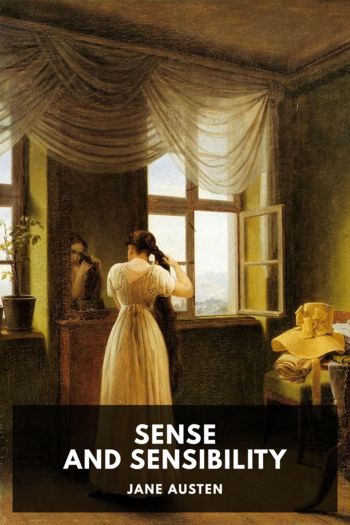Sense and Sensibility - Jane Austen (classic literature list txt) 📗

- Author: Jane Austen
Book online «Sense and Sensibility - Jane Austen (classic literature list txt) 📗». Author Jane Austen
“It was my father’s last request to me,” replied her husband, “that I should assist his widow and daughters.”
“He did not know what he was talking of, I dare say; ten to one but he was lightheaded at the time. Had he been in his right senses, he could not have thought of such a thing as begging you to give away half your fortune from your own child.”
“He did not stipulate for any particular sum, my dear Fanny; he only requested me, in general terms, to assist them, and make their situation more comfortable than it was in his power to do. Perhaps it would have been as well if he had left it wholly to myself. He could hardly suppose I should neglect them. But as he required the promise, I could not do less than give it; at least I thought so at the time. The promise, therefore, was given, and must be performed. Something must be done for them whenever they leave Norland and settle in a new home.”
“Well, then, let something be done for them; but that something need not be three thousand pounds. Consider,” she added, “that when the money is once parted with, it never can return. Your sisters will marry, and it will be gone forever. If, indeed, it could be restored to our poor little boy—”
“Why, to be sure,” said her husband, very gravely, “that would make great difference. The time may come when Harry will regret that so large a sum was parted with. If he should have a numerous family, for instance, it would be a very convenient addition.”
“To be sure it would.”
“Perhaps, then, it would be better for all parties, if the sum were diminished one half. Five hundred pounds would be a prodigious increase to their fortunes!”
“Oh! beyond anything great! What brother on earth would do half so much for his sisters, even if really his sisters! And as it is—only half blood!—But you have such a generous spirit!”
“I would not wish to do anything mean,” he replied. “One had rather, on such occasions, do too much than too little. No one, at least, can think I have not done enough for them: even themselves, they can hardly expect more.”
“There is no knowing what they may expect,” said the lady, “but we are not to think of their expectations: the question is, what you can afford to do.”
“Certainly; and I think I may afford to give them five hundred pounds apiece. As it is, without any addition of mine, they will each have about three thousand pounds on their mother’s death—a very comfortable fortune for any young woman.”
“To be sure it is; and, indeed, it strikes me that they can want no addition at all. They will have ten thousand pounds divided amongst them. If they marry, they will be sure of doing well, and if they do not, they may all live very comfortably together on the interest of ten thousand pounds.”
“That is very true, and, therefore, I do not know whether, upon the whole, it would not be more advisable to do something for their mother while she lives, rather than for them—something of the annuity kind I mean. My sisters would feel the good effects of it as well as herself. A hundred a year would make them all perfectly comfortable.”
His wife hesitated a little, however, in giving her consent to this plan.
“To be sure,” said she, “it is better than parting with fifteen hundred pounds at once. But, then, if Mrs. Dashwood should live fifteen years we shall be completely taken in.”
“Fifteen years! my dear Fanny; her life cannot be worth half that purchase.”
“Certainly not; but if you observe, people always live forever when there is an annuity to be paid them; and she is very stout and healthy, and hardly forty. An annuity is a very serious business; it comes over and over every year, and there is no getting rid of it. You are not aware of what you are doing. I have known a great deal of the trouble of annuities; for my mother was clogged with the payment of three to old superannuated servants by my father’s will, and it is amazing how disagreeable she found it. Twice every year these annuities were to be paid; and then there was the trouble of getting it to them; and then one of them was said to have died, and afterwards it turned out to be no such thing. My mother was quite sick of it. Her income was not her own, she said, with such perpetual claims on it; and it was the more unkind in my father, because, otherwise, the money would have been entirely at my mother’s disposal, without any restriction whatever. It has given me such an abhorrence of annuities, that I am sure I would not pin myself down to the payment of one for all the world.”
“It is certainly an unpleasant thing,” replied Mr. Dashwood, “to have those kind of yearly drains on one’s income. One’s fortune, as your mother justly says, is not one’s own. To be tied down to the regular payment of such a sum, on every rent day, is by no means desirable: it takes away one’s independence.”
“Undoubtedly; and after all you have no thanks for it. They think themselves secure, you do no





Comments (0)